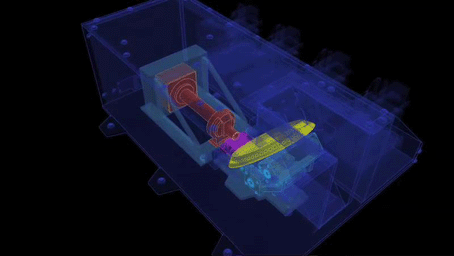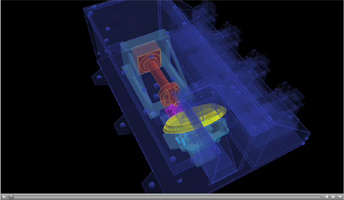
|
Schematic Animation of Phoenix’s Microscope Station
- Click the image above for a larger view
 Movie Download Options
Movie Download Options- Full-Res JPEG (800 x 451) (21.4 kB)
- Full-Res TIFF (800 x 451) (1.1 MB)
Caption:
This animation shows the workings of the microscope station of the Microscopy, Electrochemistry and Conductivity Analyzer (MECA) instrument suite of NASA's Phoenix Mars Lander.
Samples are delivered to the horizontal portion of the sample wheel (yellow) that pokes outside an opening in the box enclosure. The wheel rotates to present the sample to the microscopes. The Optical Microscope (red) can see particles a little smaller than one-tenth the diameter of a human hair. The Atomic Force Microscope (pink) can see particles forty time smaller. The samples are on a variety of substrate surfaces, the small circles on the beveled edge of the sample wheel. For scale, the diameter of the wheel is about 14 centimeters (5.5 inches). Each substrate is a circle 3 millimeters (0.1 inch) in diameter.
Background Info:
The Phoenix Mission is led by the University of Arizona, Tucson, on behalf of NASA. Project management of the mission is by NASA's Jet Propulsion Laboratory, Pasadena, Calif. Spacecraft development is by Lockheed Martin Space Systems, Denver.
Photojournal Note: As planned, the Phoenix lander, which landed May 25, 2008 23:53 UTC, ended communications in November 2008, about six months after landing, when its solar panels ceased operating in the dark Martian winter.
Cataloging Keywords:
| Name | Value | Additional Values |
|---|---|---|
| Target | Mars | |
| System | ||
| Target Type | Planet | |
| Mission | Phoenix | |
| Instrument Host | Phoenix Lander | Phoenix Mars Lander |
| Host Type | Lander | |
| Instrument | Microscopy, Electrochemistry, and Conductivity Analyzer (MECA) | |
| Detector | ||
| Extra Keywords | Color, Movie, Rotation | |
| Acquisition Date | ||
| Release Date | 2008-06-13 | |
| Date in Caption | ||
| Image Credit | NASA/JPL-Caltech/University of Arizona | |
| Source | photojournal.jpl.nasa.gov/catalog/PIA10798 | |
| Identifier | PIA10798 | |

